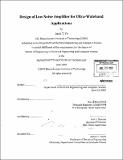Design of low noise amplifier for ultra-wideband applications
Author(s)
Vo, Danh T
DownloadFull printable version (23.53Mb)
Other Contributors
Massachusetts Institute of Technology. Dept. of Electrical Engineering and Computer Science.
Advisor
Danny Butterfield and Joel L. Dawson.
Terms of use
Metadata
Show full item recordAbstract
The recent surge in the demand for low power portable wireless electronics that can offer extremely high data rates has resulted in much active research in Ultra-Wideband (UWB) systems. UWB is widely recognized as a promising technology for high data rate, short-range applications with precise time resolution and high energy efficiency. All these benefits originate from the wideband characteristic of the transmitted/received impulse signals in an UWB system. With current technology, UWB can offer data rates up to 480 Mbps and its operational frequency spectrum is between 3.1 and 10.6 GHz. However, the wideband operation of UWB systems imposes many design challenges that have not been explored before in the traditional narrowband ones. This research is focused on the analysis and design of a low noise amplifier (LNA) for UWB applications. First, two popular narrowband topologies based on inductively degenerated common-source and common-gate configurations are introduced. A comparison between these two topologies is also presented. Then, several wideband LNA topologies are presented and analyzed to determine their suitability for wideband operation. The main emphasis is on input matching, voltage gain, noise figure, and process variation tolerance. Finally, a design procedure is proposed. Examples of applying this procedure to implement a single-ended and differential multistage LNA in 65 nm CMOS process are also given. Both LNAs are designed to have a gain of at least 45 dB, a noise figure of less than 8 dB and an S₁₁ of better than -10 dB while drawing less than 10 mA from a 1.3 V power supply. The LNA's operating frequency is 8.5 GHz.
Description
Thesis (M. Eng.)--Massachusetts Institute of Technology, Dept. of Electrical Engineering and Computer Science, 2009. Includes bibliographical references.
Date issued
2009Department
Massachusetts Institute of Technology. Department of Electrical Engineering and Computer SciencePublisher
Massachusetts Institute of Technology
Keywords
Electrical Engineering and Computer Science.